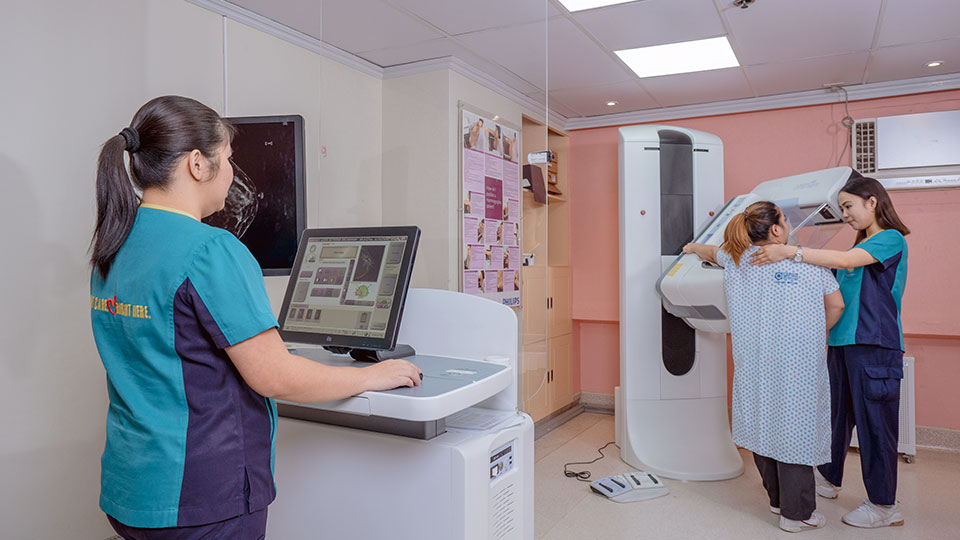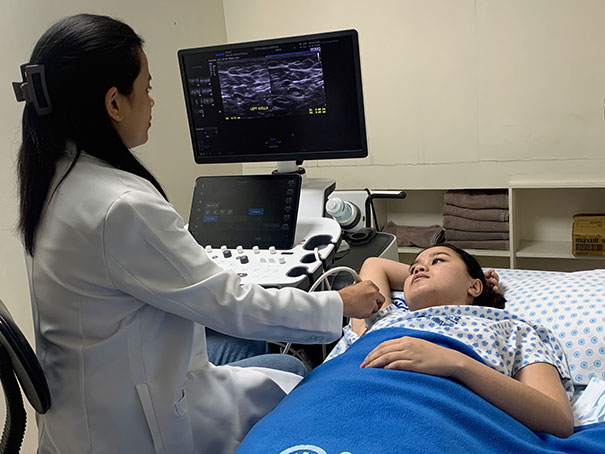- Acute Stroke Unit
- Ambulatory Oncology Treatment
- Breast Care Center
- Cardiac Catheterization Lab
- Child Development Unit
- Clinical Neurophysiology Lab
- Computed Tomography / CT Scan
- Diabetic Foot & Wound Center
- Dialysis Center
- Ear, Nose & Throat Center
- Emergency Unit 24/7
- Endoscopy Unit
- Eye Center
- Labor or Birthing Room
- Magnetic Resonance Imaging
- Minimally Invasive Surgery
- Non-Invasive Cardio Lab
- Nuclear Medicine
- OB Sonology / OB Ultrasound
- Center for Respiratory Medicine
- Sleep Center
- Skin Center
- Stone Center
- Vitality Center
Clinic Schedule:
Monday – Friday 6:00 – 7:00 pm
Saturday 9:00 – 8:00 pm
Sunday 10:00 – 9:00 pm

Breast Care Center
The CMC Breast Care Center aims to provide a multi-disciplinary approach to the diagnosis, treatment, and follow-up of conditions affecting the breast. The diagnostic modalities and the team of experts needed to effectively care for a patient with breast problems are consolidated in a single setting, making it more convenient for patients. The Center is manned by well- trained radiologists, surgeons, gynecologists, pathologists, oncologists, and technologists. A Screening Program is also being offered for early detection of breast cancer in women without symptoms who are 40 years old and above, those with a family history of breast cancer, and others who have been previously operated on.
Services Offered:
- Digital Mammography for screening and diagnosis of breast cancer.
- Breast Ultrasound using ductal echography and tissue elastography for detection and characterization of even small (millimetric) breast lesions.
- Breast MRI for further characterization of breast nodules or masses.
- Interventional procedures for the diagnosis and management of breast diseases through mammography-guided or ultrasound-guided biopsy, marking or needle localization of breast masses or lymph nodes, and ultrasound-guided aspiration of cysts or abscesses.
- Excision or biopsy of breast nodules under local or general anesthesia.
- Screening Program for early detection of breast cancer with discounted package for yearly mammography and breast ultrasound.

FAQ:
- Breast screening uses X-rays to look for breast cancers when they are too small to be seen or felt.
- The X-rays are called mammograms. The earlier and smaller a breast cancer is diagnosed and treated, the better the chance for cure.
- Breast cancer is the most common cancer in women and it is more likely to occur as you get older.
- Breast screening has been documented to reduce deaths from breast cancer.
- All women 40 years old and above should have yearly mammogram, and if needed, a breast ultrasound.
- Women with a family history of breast cancer should be screened earlier at age 30 and then with yearly mammograms from age 35 onwards.
- No, some cancers do not show up on a mammogram and sometimes cancer is not spotted. This can happen no matter how skilled the people reading the mammograms are.
- No. Screening only finds cancer if it is already there, but it can find cancers at an earlier stage.
- Having a mammogram means your breasts are exposed to a small amount of radiation.
- Most women find having a mammogram uncomfortable. Some women find it painful, but only for a few seconds.
- The procedure is carried out by a female technologist who will ask you to undress from the waist up. Please do not use talcum powder when you go for a screening.
- The Technologist will ask you a few questions and will explain what will happen. She will place one breast at a time between two special plates on the mammogram machine and will take two images of each breast. Your breast needs to be pressed firmly between the plates for a few seconds to flatten and reduce its thickness so that clearer and better images may be taken.
- A mammogram takes a few minutes. Your breast screening should take about 30 minutes
to 1 hour.
- Your results will be ready one day after the procedure. We will send it to you by email and furnish your attending physician with a copy as well.
- Getting a discount for your initial and subsequent yearly mammograms.
- In case an abnormality is found in your screening, you may be referred to one of the Center’s accredited breast specialists who may also request additional mammogram views or further tests like an ultrasound or a biopsy.
- You may also take advantage of the state- of- the-art facilities being offered by the Center like our fully digital mammogram, breast ultrasound using ductal echography, and tissue elastography for detection and characterization of even very small presentations.
- You will be taken care of by a multi-
disciplinary breast cancer team. They will talk to you about your diagnosis and your treatment options. Most cancers found at breast screening can be successfully treated since they are most likely at a very early stage. - Early diagnosis and treatment of breast cancer gives you the best chance of surviving it.
Team of Doctors
- Dr. Santi, Benigno II - Section Head
- Dr. Calalang, Editha - Radiologist

